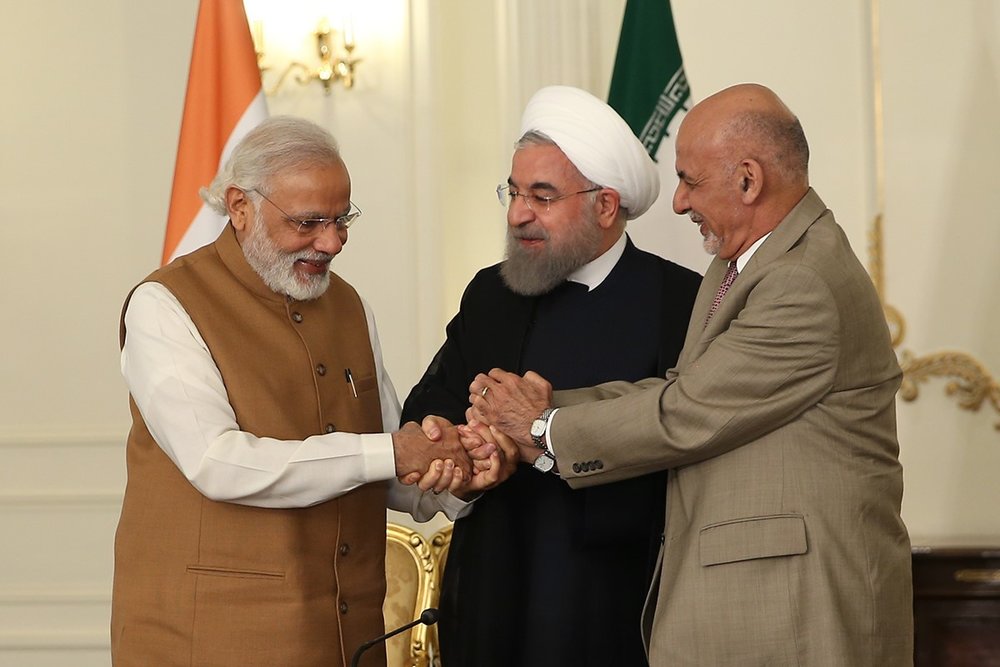Trump’s sanctions move on Iran could jeopardize U.S. goal to stabilize Afghan economy: CNBC

In a commentary published on May 29, the CNBC said Afghanistan can become a victim of a new plan by Trump’s administration to reintroduce U.S. sanctions on Iran as the penalties could block development of Iran’s Chabahar Port by India.
Following is an excerpt of the commentary by the broadcaster:
Afghanistan is at risk of become an unintended victim of the Donald Trump administration's sweeping sanctions against Tehran, announced as part of the U.S. decision to withdraw from the 2015 Iran nuclear deal in early May.
A major port complex is being developed on Iran's southern coast that is set to provide a transport corridor to Afghanistan, granting the landlocked country new access to Indian Ocean trade.
But international players leading investment and financing of the Indian-backed port are now in limbo amid fears of punishment by U.S. secondary sanctions for doing business in Iran.
The Chabahar Port project, whose development is being led by India, has been touted as having the potential to boost Afghanistan's trade by millions of dollars. It also aims to lay the infrastructural foundations to develop the impoverished country's largely untapped mining industry, which is estimated to be worth billions. India relies on Iran for overland access to Afghanistan, and sees increased trade there as a way to reduce neighboring Pakistan's leverage in the country.
Nearly 17 years after the U.S. invasion to topple the Taliban, Afghanistan remains crippled by poverty, unemployment and terrorism. The Pentagon has supported for years Indian engagement with Afghanistan's debilitated economy, which relies heavily on foreign aid, even if it required operating via Iran.
"[Chabahar] should create the job opportunities we sorely need for our youth, effectively preventing their recruitment and exploitation by terrorist networks."
Imposing policies that would penalize this investment, since it requires transacting with Iran, could threaten the longtime U.S. policy objective of stabilizing Afghanistan through economic development.
"This policy of isolating Iran runs directly counter to U.S. interests in Afghanistan," said Marcus Chenevix, MENA researcher at TS Lombard. By potentially forcing Afghanistan to sever links with one of its largest trading partners, he said, "the Trump administration is hitting the beleaguered Afghan economy with yet another shock at a time when the government is already struggling against a reinvigorated Taliban."
A trilateral memorandum of understanding signed in 2016 between India, Iran and Afghanistan committed $21 billion to the project — $9 billion for the actual port in Chabahar, and the remaining $21 billion for developing Afghanistan's iron ore export capabilities. "This deal was all about Afghanistan," Chenevix said.
Ashraf Haidari, director-general of policy and strategy at Afghanistan's Ministry of Foreign Affairs, spoke to the need for the project for security reasons, and stressed the potential for the country to become a land bridge for south and central Asia.
Ashraf Haidari, director-general of policy and strategy at Afghanistan's Ministry of Foreign Affairs, spoke to the need for the project for security reasons, and stressed the potential for the country to become a land bridge for south and central Asia.
"This would earn Afghanistan much in transit revenues, directly boosting our stagnating economic growth," Haidari told CNBC. "And that should create the job opportunities we sorely need for our youth, effectively preventing their recruitment and exploitation by terrorist networks, including the Taliban, al-Qaeda and ISIS."
The Taliban is more powerful now than at any time since the U.S. invasion, and is said to wield influence over two-thirds of the country.
Describing the sanctions in relation to Afghanistan, David Brewster, a senior research fellow at the National Security College of Canberra, told CNBC: "It's really an own-goal by the United States."
Afghanistan is still beholden to the illegal opium trade, which the International Monetary Fund (IMF) estimates is worth $2 billion annually. It's also a major source of revenue for the Taliban. The Chabahar port and trade corridor would ostensibly create more opportunities for
Afghan exporters and farmers, on whose behalf Afghan officials have been lobbying Washington for sanctions exemptions — so far to no avail.
"The ripple effect on Afghanistan, India and Pakistan from much more combative U.S. policy on Iran has either not been thought through or considered merely of secondary importance," said Hasnain Malik, director of frontier markets equity strategy at London-based
investment bank Exotix. "The prospects of stabilizing Afghanistan, and ultimately withdrawing U.S. troops, requires the cooperation of all regional powers, including Iran."
In this respect, he said, it's in Afghanistan's interest to have access to as many ports as possible — currently it is beholden to Pakistan, with which it's had frequent disputes and border closures.
Haidari, meanwhile, at the Afghan Foreign Affairs Ministry, remains optimistic that Chabahar's backers may yet win an exemption from Washington.
"We are confident that an exception could be made in this case," he said, "so that any impending U.S. sanctions would not undermine India's well-intentioned, win-win investment in the implementation of our trilateral agreement."
